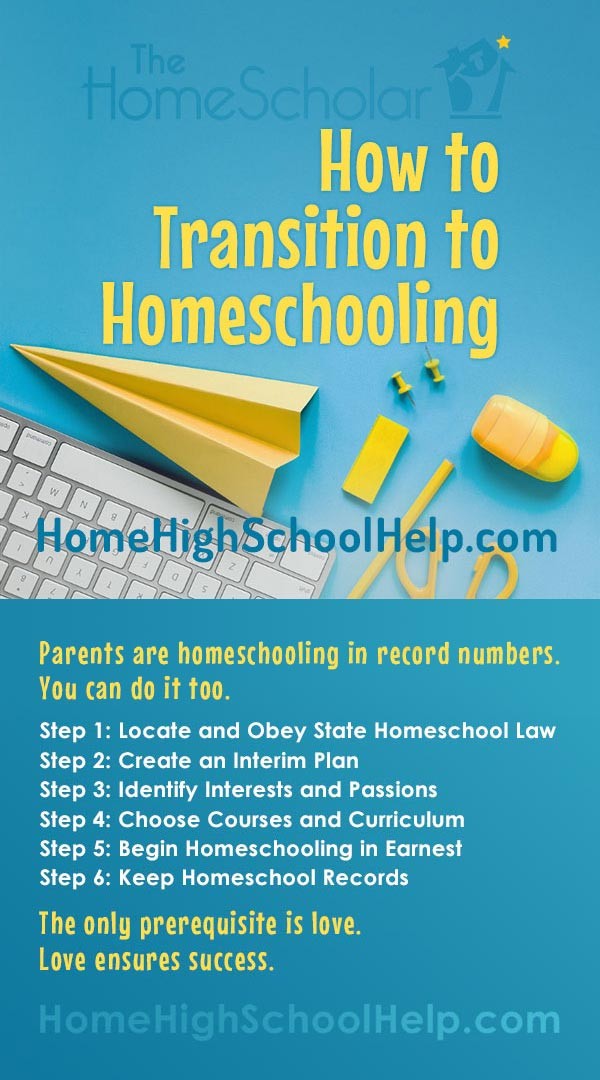The transition to homeschooling, from public or private school, can take some time. Even when parents and children are eager to homeschool, the change in attitude may not happen immediately. But an attitude change WILL happen over time. It can take some kids longer than others to “wash that school right outta their hair.” Try not to allow yourself to become overwhelmed or discouraged as you make this change.
Affiliate Disclaimer: This post contains affiliate links.
If you click and buy, I may make a few pennies, but not enough for a latte.
When you haven’t been homeschooling all along, you haven’t been able to ooze into the idea slowly. Lots of parents ask me how to navigate this road. Here are some easy tips to transition to homeschooling.
- Know your child and trust yourself. You know your child better than anyone else, so trust your intuition. With some dedicated time for research, you can figure out what to do, and how to do it. Many parents have gone before you and it can be done!
- Deschool if necessary. Some students will benefit from “deschooling” in their transition. If your child seems to need to jump right into academics, provide that for them of course. But if you think they need some deschooling time in order to regain a love for learning, make that time for them and don’t rush it. Whatever you do, don’t try to “over school” all at once as soon as they come home in an attempt to compensate for what you think they’ve missed. That’s a path to burnout and rebellion! I recommend this book: Deschooling Gently: A Step by Step Guide to Fearless Homeschooling. Another favorite of mine is The Relaxed Homeschooler Rides Again.
- Find your child’s interests. Remember that attitudes can change. Sometimes teens come home after being in public school with a really rotten attitude, and it takes a little while for them to return to the cheerful, cooperative person they used to be. I have seen this sort of thing before, and usually when they find something that really interests them, they become easier to live with. Sometimes it’s just a stage they’re going through, a transition. Also, remember that you can always tweak things as you go. What works (or doesn’t work) may or may not work down the road. Try to find anything that interests your child that is NOT gaming or phone or technology. It doesn’t have to be academic; it could be art, or music, or a sport.
- Have a family meeting. Be sure you and your spouse are on the same page, and for that matter, be sure to bring your kids into the conversation as well. Come up with goals as a family. The more “buy in” your kids have, the easier your transition to homeschooling will be. You can try letting the student have more control over school (not less control, like with an accredited, online, or alternative education program.) Ask your child their preferences. What would they want to study? Be sure to cover the core subjects, but still provide a lot of free time when finished with the core.
- Do your research. Knowing what your state requires for homeschooling is essential. Each state is different, and you need to know that homeschooling laws aren’t the same as what the public schools will follow. Be sure to find your state laws in my article here. When you have stopped public or private school, the impulse is to try to complete all of high school within days or months. I encourage you to take a more long-term view. That starts with finding the love of learning, so the child can learn how to learn with interest.
- Find a support network for yourself. Whether that’s in your community (many communities have a local homeschool organization) or online, having support is essential to your transition to homeschooling. There will be times that you need to vent to another homeschool mom, someone that gets it and is in the trenches with you. Or, you might just want some advice about your next math curriculum. Trust me, you’ll want this support – for many reasons.
- Find a support network for your kids. Planning social times with new friends (as well as old!) will be important for their transition. It’s important if they already have a good set of friends. Just like you need homeschool support, your child does too. Read How to Find Friends for Homeschool Socialization. They will want someone in their corner that understands what their school day looks like and can be social during the middle of the day. Many times, your local support group (that you’ve found) can provide those new friends for your children. Be sure to ask them if they have activities for teens!
- Get expert help. You may want some expert advice and supportive encouragement as you transition to homeschooling. I offer a subscription to my Gold Care Club. It’s a way for you to get advice for struggles you might be facing in your homeschool and life! You can find out more about this service here.
Learn more in my video review below!






I like number 3: choose interests, because engaging children in topics and activities that bore them will only make homeschooling difficult. Thank you for sharing these tips!
Glad to be of help!
Blessings ~
Jennifer, Assistant to Lee